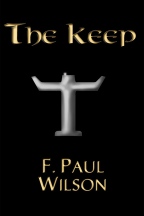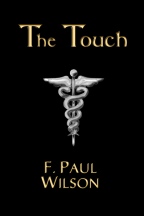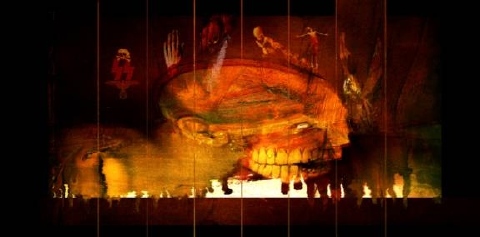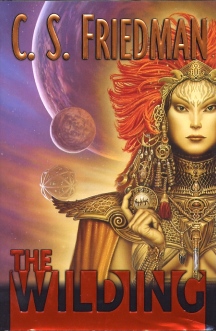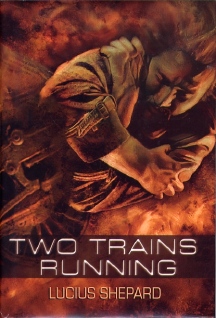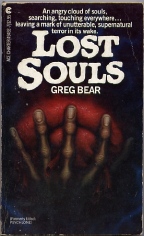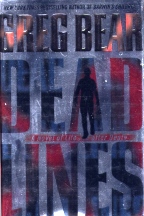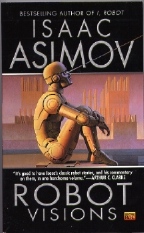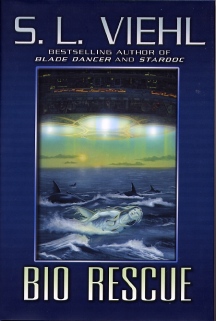|
|
|
This Just in..News from the Agony Column
|
06-18-04: F. Paul Wilson Exclusive on Re-Writing Literary History |
||||||||
Updating
the Adversary Cycle
I'd recently bought the first two volumes in their current series of F. Paul Wilson re-prints from Mark V. Ziesing. Like many writers, F. Paul Wilson's written universe is full of strange connections. He's got two series and they intersect in one critical and difficult to find novel. 'The Tomb' is available as a cheesy paperback and as a mind-bogglingly expensive limited edition. It advances the story that started in 'The Keep' and became part of 'The Adversary Cycle'. It's also the first Repairman Jack novel. So, if you want to introduce your friends to Repairman Jack, whose recent adventures ('Legacies', 'Conspiracies', 'All the Rage', 'Hosts' 'The Haunted Air' and 'Gateways') have been a perennial summer highlight, you'd have to scare up the 1998 edition of the paperback version of 'The Tomb'. This is clearly sub-optimal to the book-obsessed.
The new, signed and numbered editions of these novels are limited to 1,000 copies, and offer the expected Borderlands quality production values. The spines of the novels are excerpts from an artwork by the now famous Caniglia, and the understated but effective covers are by Matt Eames. But most importantly, these Borderlands editions offered the author a chance to fearlessly re-sculpt his old material and make great books even better.
So that's what we can expect from the novel -- and I have to admit
that what I didn't expect was such a great sense of humor. It's always
refreshing
to find a writer who takes his work -- but not himself -- seriously. |
|
06-17-04: A Sequel Born Wild |
|||
'The
Wilding' Follows Up 'In Conquest Born' by C. S. Friedman
I'm not going to give you even a smidgen of DJ-run down, first, because there's no easy way to boil it down, and second because it amounts to: the battle continues two-hundred years later. What I can tell you is that the novel includes thirty pages of Glossary in case you don't recall what a "Shaka" is or who "Harkur the Great" was. That's probably most of us, so consider the Glossary Very Helpful. There's no question that what is going on is quite complex, involving the machinations of empires, psychics, genetically-designed warriors and the echoes of an ancient curse…curse…curse. So far, we have a perfect recipe for gobble-de-gook reading of the highest order. But go just one extra mile, just one extra page and you'll find something quite shocking considering what you might expect, given what you can glean from the DJ notes and the admittedly stunning Michael Whelan cover. You'll find some snappy, rocking, grabs-you-and-holds-you prose that is clear, and very down-to-earth, considering how pie-in-the-sky this all sounds. It reads more like a gritty mystery than a weird-as-all-get-out science fiction novel. Now I have no doubt that it might get weird as all get-out, but if it gets there via the strong, precise prose voice that begins the novel, then things start to seem really interesting, really fast. I have to admit that I like all the space opera elements that Friedman has assembled here, and there's lots of room for her to develop the kind of complex and imaginative story that makes space opera so much fun. But wait -- there's more! I've never noticed this before, but there's a "DAW Books Collector's Number" on the colophon page, in this case, 1296. Is that to indicate that there have been a mere 1,296 books released by Donald A Wollheim Books? Remember, these guys were re-releasing the entire Philip K. Dick SF catalogue in the 1980's. I would have thought they'd be further along than 1296 by now. But perhaps I'm mistaken. Still, it's a fascinating detail for this deceptive book. It looks like the most baroque of space operas; but -- at least as it begins -- it reads like a blithe interview with a babysitter for either baby Hannibal Lecter -- or perhaps his victims. The combination is intriguing enough to send me back for her first novel, 'In Conquest Born'. What makes a book worth reading? Effective writing. Friedman clearly has what it takes to make her books worth reading. |
|
06-16-04: Take the A Train |
|||
'Two
Trains Running' by Lucius Shepard
But back in 1998, Shepard was working on a fascinating project, and he talked about it extensively in his reading at the World Fantasy Convention. In the midst of headlines about a serial killer who was dubbed 'The Railroad Killer' for his habit of hitching a ride on freight trains, Shepard joined FTRA, the Freight Train Riders of America. He traveled with two gents named Missoula Mike and Madcat, and turned the experience into an article for Spin magazine. Now Golden Gryphon offers that article, and two novellas based on Shepard's experiences in 'Two Trains Running', another in their efforts to achieve Global Domination. Since most us aren't particularly thrilled with the way things are currently being handled, we wish them well. 'Over Yonder' is Shepard's utterly fantastic vision of his voyage. In this, the longest work of this collection, Billy Long Gone chases a stranger onto a train that proves stranger than anything he's yet encountered. The train itself appears to be alive, and it takes Billy to places clearly not part of the world the rest of us are currently inhabiting. The further he travels, the stranger things get, the healthier Billy gets, recovering his memory and perhaps his life. But nobody picks up a Lucius Shepard book thinking the answers are going to be easy. That's even more clearly the case in 'Jailbait', the gritty, real-world novella that debuts in this collection. Young girl. Runaway. Old guy. Train. That's a one-plus-one-plus-one-plus-one equals horrible awfulness equation. I think I can handle this story; I'll let you know. Shepard has a way of making even the meanest men and women he can conceive look good with his powerful language. Starting it all off is an Introduction by Shepard describing how he got himself into such a pickle. It actually sounds pretty easy. Spin asks for an article. You're a writer with a taste for adventure and a need for money. End of story. Or, in this case, start of story; or more precisely three stories; that is, 'Two Trains Running'. |
|
06-15-04: New Old-School Philosophical Science Fiction Horror |
||||||
Greg
Bear from 'Lost Souls' to 'Dead Lines'
I've been wanting to get back into Bear's work for a while, but missed the boat with the acclaimed and award nominated 'Darwin's Radio', and I'm really happy to have this opportunity to see what Bear does with this potentially powerful subject. I frankly don't want to tell you any more about this until I've read and reviewed it; the reviews I glimpsed at give away far too much for my taste, and I'd suggest readers give them a pass. At 246 pages, it's a one or two day read. If you're willing to wear your white gloves at the beach, I suspect it might even be an appropriate choice to provide a summer chill. I just hope I don't have to dig it out of a box in the garage twenty years on, in a world that will call this book's future the distant past. By then, I'd better have enough shelves to hold all my books -- perhaps even my brain in bell jar. |
|
06-14-04: Kim Stanley Robinson Interview; Asimov's Universal Robots; From StarDoc to 'Bio Rescue' |
|||
Politics and the Line from the Present to the Future
Trust me, if this is how you spend your lunch hour, prepare to spend some money on his books going home, especially the ultra-fascinating and dense alternate history -- which to me reads like a rigorous, consummately well-written fantasy or metafiction, 'The Years of Rice and Salt', or his latest page-turning combination of environmental polemic and domestic comedy, 'Forty Signs of Rain'. Robinson considers most of his work comedic in nature. That's not how I might have guessed it would be, but that's how it pans out; the Human Comedy, shot through a careful imagination that gets the details right to create fantasies that seem to be written in the worlds they imagine. |
|||
'Robot Visions' by Isaac Asimov
In the interim, 'Robot Visions' will act as a nice complement to 'Robot Dreams' covered a couple weeks ago in this column. There may be some overlap in the stories, but the real reason to get this volume is the thick chunk of non-fiction essays. They're short, snappy and all over the spectrum. This one is available as a mass-market paperback, with cover art by Ralph McQuarrie. You'll have lots of chances to read Asimov's fiction. You won't find these essays so easily, however. Asimov, of course, leaned towards what is today called "hard" science fiction -- I suppose -- which makes these essays all the more essential.
|
|||
S. L. Viehl Dives into Space Opera
'Bio Rescue' fires off the adventures of Commander Dair mu T'resa, finned defender in the planetary patrol. Dair can survive outside of her normally aquatic habitat, but it only makes things harder for her. That big ol' universe gives her some ideas that there might be something beyond beyond being bare-finned and…well, she signs up for an off-planet Bio Rescue unit, and finds that in space, the water is hotter than it is at home. Enemies are more easily made and more difficult to distract. Viehl is an established author for providing fun, fast moving space opera, and this is her second hardcover release. I'm wondering if she's going to capitalize on the Little Mermaid myth potential here. Forget the cartoon. There's a lot of mermaid lore that's not trying to sell toys. Merfolk have as strong a tradition as Faerie, and once you get into that level of perception, a lot of depth and fascinating intimations are possible, even in a fun little space opera. Never doubt the power of myth. Readers once again have to remember to support authors with a track record such as Viehl as they move into hardcover if they want to see publishers willing to take any chances whatsoever. Viehl's combination of space opera and oceanic species promises to chart new waters. |
